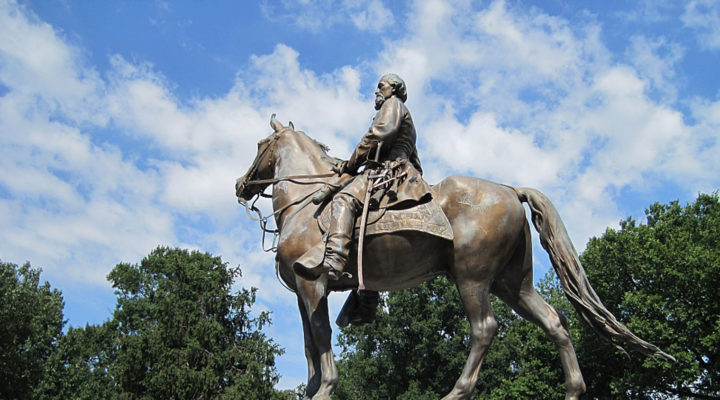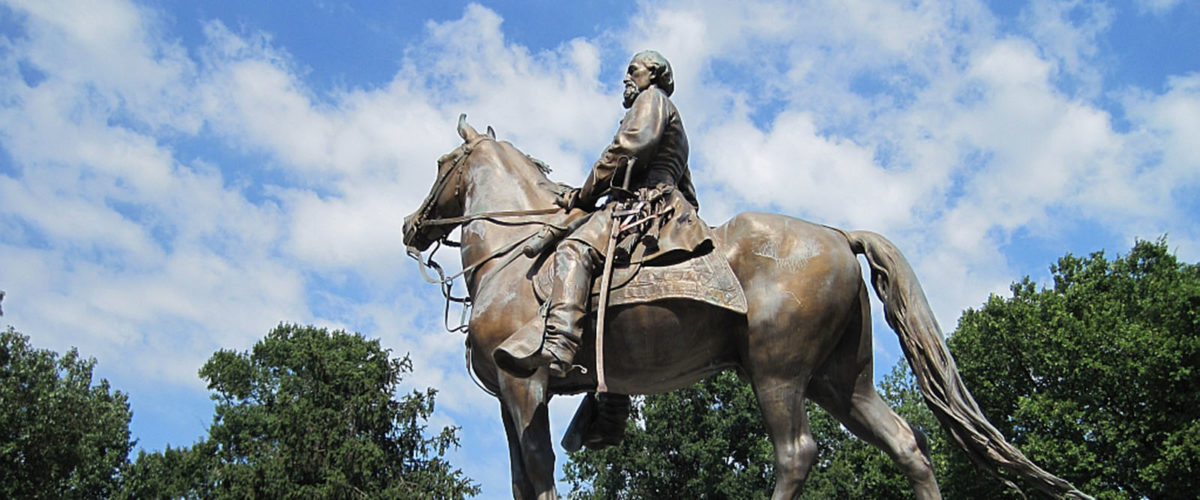The president of the Southern Baptist Convention joined more than 170 black and white clergy in Memphis, Tenn., in an open letter Sept. 13 seeking permission from the state or local officials to remove a Confederate monument from a city park.
Steve Gaines, pastor of Bellevue Baptist Church in Cordova, Tenn., joined leaders of 100 area congregations and institutions in the letter asking the Tennessee Historical Commission to grant Memphis Mayor Jim Strickland’s request for a waiver from a state law in order to relocate the statue of Nathan Bedford Forrest from Health Sciences Park in downtown Memphis “to a more historically appropriate site,” such as a museum.
“By no means are we seeking to erase history,” the clergy letter says in part. “It is imperative that we understand history; the foundations of our society, of our country, and our faith traditions are built on that. But it is also important that we understand historical figures and events in their full context. It was not until 1905 — half a century after the Civil War and in the throes of the implementation of Jim Crow laws across the South — that the statue of Forrest was placed in a public square. This monument to Forrest belongs elsewhere, not in the center of our city’s hub. Beyond the historical inaccuracy and geographic irrelevancy of his monument, it does not represent who we are as people of faith.”
Gaines, pastor of the large Southern Baptist megachurch since 2005, said in comments quoted by Baptist Press that both the statue of Forrest, a controversial Confederate general, and another monument honoring Confederate President Jefferson Davis in Memphis Park “are a source of offense to many citizens of Memphis” because both men supported slavery.
“Fair-minded Americans acknowledge that slavery was cruel and unchristian,” Gaines said. “Indeed, slavery stands as one of the darkest blights of our nation’s history. Thus, these statues should be relocated to less prominent, more appropriate settings.”
Other signers include David Breckenridge, pastor of First Baptist Church in Memphis, Stephen H. Cook, pastor of Second Baptist Church, and Richard Hipps, pastor of Trinity Baptist Church in Cordova, Tenn., three congregations aligned with the Cooperative Baptist Fellowship.

Stephen Cook
Cook explained his reasons for signing the letter in a newspaper op-ed co-written with Sean Michael Lucas, senior minister at Independent Presbyterian Church, a 2,000-member congregation affiliated with the Presbyterian Church in America.
“Surely as Christians compelled by the love of God in Christ, we should listen to those for whom the Forrest statue brings back memories of Jim Crow and the divisive, painful past,” the two white ministers said in a Sept. 14 column in the Memphis Commercial-Appeal. “We should be willing to go the extra mile for our neighbors because Christ in his love has done so for us.”
The Memphis city council voted in 2015 to remove the large bronze statue of Forrest, a slave trader and Klansman revered after the Civil War in the “Lost Cause of the Confederacy” narrative popularized in the early 20th century as challenges to Jim Crow laws threatened the status quo in the segregated South.
In order to do that, the city must get a waiver from the Tennessee Heritage Protection Act, a law passed by the state’s Republican-controlled legislature in 2013 that bars cities or counties from changing the names of parks, streets or monuments memorializing any war in which the United States has fought in the nation’s history.
The broad language notwithstanding, opponents say the legislative intent was an unsuccessful attempt to stop Memphis from renaming three Confederate parks in 2013. As support for removing Confederate symbols spread across the country following the 2015 assassination of nine African-American worshipers at Emanuel African Methodist Episcopal Church in Charleston, S.C., Tennessee lawmakers amended the law in 2016 to require anyone interested in renaming, removing or relocating such memorials to receive a two-thirds vote from the Tennessee Historical Commission rather than a simple majority.
Opposition to Confederate monuments in southern cities continued to intensify this summer after deadly violence in Charlottesville, Va., and comments by President Trump largely viewed as giving tacit support for white supremacists. Tensions boiled over Aug. 19 in Memphis, when protesters tried unsuccessfully to cover the 21-foot-6-inch-tall statue of Forrest with a bed sheet and then a banner, prompting a half-dozen arrests.
While controversy over the Memphis monuments has been going on a long time, observers say the addition of support from conservative religious leaders like Gaines, whose denomination was founded by slaveholders, indicate growing consensus over an issue that a few years ago might have been dismissed as a special interest for African Americans.
The Southern Baptist Convention, the nation’s second-largest faith group behind Roman Catholics, tried to atone for its racist past with an apology to African Americans on the convention’s 150th anniversary in 1995. More recently the SBC passed a resolution discouraging displays of the Confederate flag in 2016 and another condemning alt-right white supremacy in 2017.
Gaines said Aug. 20 in a panel discussion on race and the alt-right at Cornerstone Baptist Church in Arlington, Texas, that it isn’t enough for white Christians to expect African Americans to just “get over” things that happened to their ancestors hundreds of years ago.
“It’s hard for anybody to get over history and realities, and there’s no doubt that slavery affected the African Americans that have come up all through American history and also in England and all the other places,” Gaines said in response to a question from an audience member.
“It’s hard to be sold. It’s hard to even fathom what it was like at those auction blocks when families were torn apart: perhaps a mother go with one child and the father go with another child and sometimes the children just go by themselves,” he said. “I have 10 grand babies and one is on the way. I can’t even fathom my children being sold into slavery. So there’s no doubt that has a huge impact. So I feel like for somebody to say ‘get over it,’ that’s a wrong response.”



